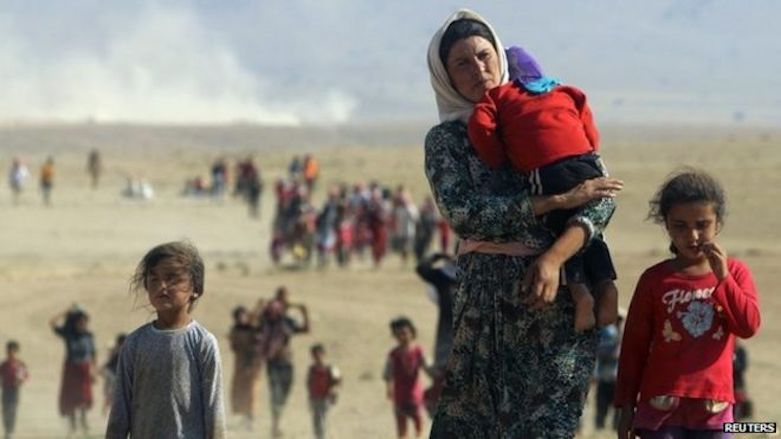Top Kurdistan Region officials mark anniversary of Yezidi genocide

ERBIL (Kurdistan 24) – Top officials from the Kurdistan Region on Monday marked the sixth anniversary of the Yezidi genocide in 2014, in which thousands of people were brutally murdered, kidnapped, and trafficked at the hands of the so-called Islamic State.
Masoud Barzani, the former president of the Kurdistan Region and current leader of the Kurdistan Democratic Party (KDP), in a statement, described the crime as a “deep wound” that “would never be forgotten.”
Yezidis became the subject of the terrorists’ hatred and backwardness due to their “Kurdish identity, religion, and beliefs,” Barzani wrote, the genocide against Yezidis “was the continuation of the series of persecution conducted against Kurdish people throughout history.”
Six years ago, the so-called Islamic State attacked Sinjar (Shingal), predominantly inhabited by Yezidis, in which the terror group subjected women and girls to sexual slavery, kidnapped children, forced religious conversions, and abused, sold, and trafficked women across areas they controlled in Iraq and Syria, actions now widely recognized as genocide.
“I reiterate my full support for the demands of my Yezidi brothers and sisters to proudly return to their homeland,” and to have a “safe and dignified life free of any persecution,” Barzani stressed.
Barzani added that Shingal has to be in the hands of its “indigenous owners,” claiming that the Iraqi government failed to fulfil the agreement that was reached after the incident of Oct. 16, 2017, to hand over the administration of Shingal to the Yezidis.
Therefore, until now, “Yezidis are uncertain about their life and future, and have not returned to their areas,” and it is a “colossal injustice.”
Kurdistan Region President Message
Likewise, on the anniversary of the Shingal tragedy, Kurdistan Region President Nechirvan Barzani commemorated the tragedy that “no one imagined that in the 21st century, humanity would witness such horrendous events.”
President Barzani addressed that “wounds of our Yezidi sisters and brothers have not healed” as thousands of Yezidis are still in refugee and displaced person camps.
Moreover, the war-devastated Yezidi areas have not been reconstructed yet, and safety and stability are not guaranteed as “unlawful gunmen” have turned Shingal into “a safe haven” for pursuing their political agendas at the expense of Yezidi’s deep wounds and calamities.
President Barzani reiterated that the Kurdistan Region would “continue its efforts to restore peace and stability” and would facilitate the reconstruction and efforts to “turn the area into a governorate.” Also, the Kurdistan Region would continue to work with the United Nations and UNITAD until there is “international recognition of these crimes as genocide.”
At the end of his statement, President Barzani honored “the memories of the Peshmerga heroes” who sacrificed their lives for the liberation of Shingal “under the direct leadership of President Masoud Barzani.”
On late Sunday, Kurdistan Region Prime Minister Masrour Barzani said on the anniversary of the Yezidi tragedy that “despite the atrocities, killings, and violations our Yezidi brothers and sisters faced, they continue to protect their language, identity, culture, and their religion.”
Read More: Kurdistan PM praises Yezidi resilience on anniversary of genocide by ISIS, calls for support
Before the 2014 attack, there were roughly 550,000 Yezidis in the Kurdistan Region and Iraq. As the terror group took over large swaths of territory in Nineveh province, 360,000 Yezidis escaped and found refuge elsewhere, according to the Kurdistan Region’s Yezidi Rescue Office.
Editing by Karzan Sulaivany
